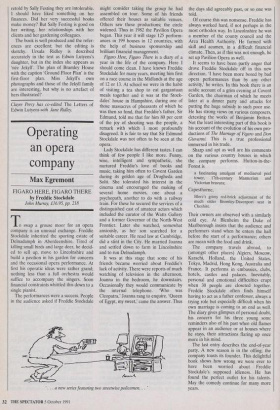Operating an opera company
Max Egremont
FIGARO HERE, FIGARO THERE by Freddie Stockdale John Murray, £16.95, pp. 218 To swap a grouse moor for an opera company is an unusual exchange. Freddie Stockdale inherited the sporting estate of Delnadamph in Aberdeenshire. Tired of killing small birds and large deer, he decid- ed to sell up, move to Lincolnshire and build a pavilion in his garden for concerts and the occasional opera performance. At first his operatic ideas were rather grand; nothing less than a full orchestra would suffice to accompany the singers. Soon financial constraints whittled this down to a single pianist.
The performances were a success. People in the audience asked if Freddie Stockdale might consider taking the group he had assembled on tour. Some of his friends offered their houses as suitable venues. Others saw these productions; the circle widened. Thus in 1982 the Pavilion Opera began. This year it will stage 125 perform- ances in 199 houses in 12 countries, with the help of business sponsorship and brilliant financial management.
Figaro Here, Figaro There is a diary of a year in the life of the company. Here I should come clean. I have known Freddie Stockdale for many years, meeting him first on a race course in the Midlands at the age of 12 or 13. At school we were in the habit of visiting a tea shop to eat gargantuan meals together and it was at the Stock- dales' house in Hampshire, during one of those massacres of pheasants of which he was then so fond, that Freddie's father, Sir Edmund, told me that for him 80 per cent of the joy of shooting was the people, a remark with which I most profoundly disagreed. It is fair to say that Sir Edmund Stockdale was not often to be seen at the opera.
Lady Stockdale has different tastes. I can think of few people I like more. Funny, wise, intelligent and sympathetic, she nurtured Freddie's love of books and music, taking him often to Covent Garden during its golden age of Drogheda and Solti. She tolerated his interest in the cinema and encouraged the making of several home movies, one about a psychopath, another to do with a railway train. For these he secured the services of a distinguished cast of amateur actors which included the curator of the Watts Gallery and a former Governor of the North-West Frontier. Later she watched, somewhat anxiously, as her son searched for a suitable career. He read law at Cambridge, did a stint in the City. He married Joanna and settled down to farm in Lincolnshire and to run Delnadamph.
It was at this stage that some of his friends became worried about Freddie's lack of activity. There were reports of much watching of television in the afternoon, Joanna in the bedroom, he downstairs. Occasionally they would communicate by the internal telephone. 'Who was Cleopatra,' Joanna rang to enquire. 'Queen of Egypt, my sweet,' came the answer. Thus . a new series featuring two streetwise policemen. . . ' the days slid agreeably past, or so one was told.
Of course this was nonsense. Freddie has always worked hard, if not perhaps in the most orthodox way. In Lincolnshire he was a member of the county council and the Area Health Authority. He farmed with skill and acumen, in a difficult financial climate. Then, as if this was not enough, he set up Pavilion Opera as well.
It seems to have been partly anger that drove Freddie Stockdale off in this new direction. have been more bored by bad opera performances than by any other activity,' he writes. In this book there is an acidic account of a grim evening at Covent Garden, the chairman of which he meets later at a dinner party and attacks for putting the huge subsidy to such poor use. He has strong views on various composers, detesting the works of Benjamin Britten. Not the least interesting part of this book is his account of the evolution of his own pro- ductions of The Marriage of Figaro and Don Giovanni. This is a true professional immersed in his trade.
Sharp and apt as well are his comments on the various country houses in which the company performs. Hutton-in-the- Forest is
a fascinating amalgam of mediaeval peel tower, 17th-century Mannerism and Victorian bravura;
Capesthorne,
Blore's grimy red-brick adjustment of the much older Bromley-Davenport seat in Cheshire.
Their owners are observed with a similarly cold eye. At Blenheim the Duke of Marlborough insists that the audience and performers stand when he enters the hall before the start of a performance; others are mean with the food and drink The company travels abroad, to (amongst other places) Algiers, Moscow, Karachi, Holland, the United States, Tokyo, Madrid, Hong Kong, Australia and France. It performs in embassies, clubs, hotels, castles and palaces. Inevitably, personal and emotional difficulties erupt when 30 people are closeted together. Freddie Stockdale often finds himself having to act as a father confessor, always a trying role but especially difficult when his own marriage is coming to an end as well. The diary gives glimpses of personal doubt, his concern for his three young sons: reminders also of his past when old flames appear in an audience or at houses where he stays, their attractions flaring up once more in his mind.
The last entry describes the end-of-year party. A new season is in the offing; the company toasts its founder. This delightful book shows how wrong we were ever to have been worried about Freddie Stockdale's supposed idleness. He has found the perfect outlet for his talents. May the comedy continue for many more years.


















































 Previous page
Previous page